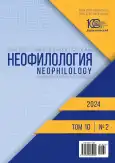Causes and consequences of language manipulation with the concept of «patriotism» and criteria its distinction with nationalism
- Authors: Mozgovoy V.I.1
-
Affiliations:
- Donetsk State University
- Issue: Vol 10, No 2 (2024)
- Pages: 282-293
- Section: RUSSIAN LANGUAGE. LANGUAGES OF PEOPLES OF RUSSIA
- URL: https://journal-vniispk.ru/2587-6953/article/view/295591
- DOI: https://doi.org/10.20310/2587-6953-2024-10-2-282-293
- ID: 295591
Cite item
Full Text
Abstract
INTRODUCTION. The concepts of “nationalism” and “patriotism”, “nazification” and “denazification” are used in the modern context without taking into account the history of their formation, which increases the possible escalation of social conflicts. The purpose of study – is to identify the causes and consequences of linguistic manipulation of the concept of “patriotism” and the criteria for its distinction with the concept of “nationalism”.MATERIALS AND METHODS. The studied facts of history examine the stages of development of nationalism and patriotism in the countries of Europe, the Russian Empire, the USSR and in the post-Soviet space. To study their interaction, a comparative historical method of understanding reality is used.RESEARCH RESULTS. The types of states that are built on different principles depending on the attitude of the power elites to patriotism and nationalism are analyzed: (1) protonationalism of Ancient Greece, formed on the basis of slavery; (2) nationalism in Europe with an amendment to the inviolability of property and individual freedom in bourgeois states, justifying the colonization of “unenlightened” peoples; 3) patriotism in the Russian Empire, established on the basis of Orthodoxy and citizenship, taking into account national and territorial covertness; (4) Soviet patriotism, built on the ideology of internationalism, equality and unity of national republics; (5) neopatriotism, which excludes nationalism as an ideology of superiority “titular” of a nation or state.CONCLUSION. The signs of nationalism are determined, revealing its destructive essence and making it possible to consolidate the social essence of patriotism in the structure of personal, state and interethnic relations. the significance of the model of openness of cultures, economies, religions and languages that create conditions for the formation of multipolar civilizations is substantiated.
About the authors
V. I. Mozgovoy
Donetsk State University
Author for correspondence.
Email: mowi48@mail.ru
ORCID iD: 0000-0002-4301-6585
Cand. Sci. (Philology), Associate Professor, Associate Professor of Russian Language Department
24 Universitetskaya St., Donetsk, 283001, Russian FederationReferences
- Mozgovoy V.I. Ukrainian legislation on national language policy and the reality of social processes (1917–2021). Neofilologiya = Neophilology, 2022, vol. 8, no. 2, pp. 228-242. (In Russ.) https://doi.org/10.20310/2587-6953-2022-8-2-228-242, https://elibrary.ru/ijnobo
- Kiyasov S.E. Abbot A. Barruel about the causes and organizers of the french revolution. Vestnik Volgogradsko-go gosudarstvennogo universiteta. Seriya 4. Istoriya, Regionovedenie. Mezhdunarodnye otnosheniya = Science Journal of Volgograd State University. History. Area Studies. International Relations, 2017, vol. 22, no. 6, pp. 133-144. (In Russ.) https://doi.org/10.15688/jvolsu4.2017.6.13, https://elibrary.ru/zxntoz
- Arshin K. Nationalism. Filosofskaya antropologiya = Philosophical Anthropology, 2018, vol. 4, no. 1, pp. 154-174. (In Russ.) https://doi.org/10.21146/2414-3715-2018-4-1-154-174, https://elibrary.ru/uwjfmg
- Mozgovoi V.I. National language and nationhood in the context of donbass. Novye gorizonty rusistiki [New Horizons of Russian Studies], 2019, no. 7, pp. 137-145. (In Russ.) https://elibrary.ru/zzikoy
- Mozgovoy V.I. National language in the history of Russian statehood. Neofilologiya = Neophilology, 2023, vol. 9, no. 1, pp. 8-20. (In Russ.) https://doi.org/10.20310/2587-6953-2023-9-1-8-20, https://elibrary.ru/hmtede
- Vorkachev S.G. Strana svoya i chuzhaya: ideya patriotizma v lingvokul’ture [Our Own and Foreign Country: the Idea of Patriotism in Linguistic Culture]. Moscow, INFRA-M Publ., 2023, 151 p. (In Russ.)
- Starostin A.M., Ponedelkov A.V., Tovancheva E.N. Culture of patriotism: cognitive, emotionalmotivational, behavioral, institutional aspects. Kaspiiskii region: politika, ekonomika, kul’tura = The Caspian Region: Poli-tics, Economics, Culture, 2023, no. 3 (76), pp. 152-159. (In Russ.) https://doi.org/10.54398/1818510X_2023_3_152, https://elibrary.ru/zlmnne
- Uorf B. Language, mind, and reality. Epistemologiya i filosofiya nauki = Epistemology & Philosophy of Science, 2016, vol. 50, no. 4, pp. 220-243. (In Russ.) https://elibrary.ru/ygdwwh
- Evseeva Ya.V. Language studies in sociolinguistics and other social sciences: issues and perspectives: introduc-tion to the thematic section. Sotsial’nye i gumanitarnye nauki. Otechestvennaya i zarubezhnaya literatura. Se-riya 11: Sotsiologiya = Social Sciences and Humanities. Domestic and Foreign Literature. Series 11: Sociology, 2021, no. 1, pp. 9-19. (In Russ.) https://doi.org/10.31249/rsoc/2021.01.01, https://elibrary.ru/zufmhh
- Golovko E.V. Language as an instrument of ethnic self-identification. Doklady i soobshcheniya Mezhdunarodnоi konferenции «Yazykovoe edinstvo i yazykovoe raznoobrazie v polikul’turnom gosudarstve» [Reports and Messages of International Conference “Language Unity and Language Divesity in a Polyethnic State”]. Moscow, LLC “Yazyki narodov mira“, 2018, pp. 44-46. (In Russ.) https://elibrary.ru/yxbqrf
- Mozgovoy V.I. Natsionalizm i patriotizm. Uroki sovremennoi istorii nezavisimoi Ukrainy [Nationalism and pa-triotism. Lessons from the modern history of independent Ukraine]. Doklady i vystupleniya na Mezhdunarodnoi nauchnoi konferentsii «Raspad SSSR: 10 let spustya» [Reports and Speeches at an International Scientific Conference “Collapse of the USSR: 10 Years Later”]. Moscow, Slovo Publ., 2002, vol. 1, pp. 339-341.
- Krom M.M. Patriotism, The Smoke of the Homeland. St. Peterburg, European University in Saint Petersburg Publ., 2020, 160 p. (In Russ.)
- Mozgovoy V.I. The Russian national language and “written law”. Sbornik statei po materialam 7 Mezhdunarodnoi nauchno-prakticheskoi konferentsii «Yazyk. Pravo. Obshchestvo» [Proceedings Based on the Materials of the 7th International Scientific and Practical Conference “Language. Right. Society”]. Penza, Penza State University Publ., 2023, pp. 205-211. (In Russ.) https://elibrary.ru/wrdbbu
Supplementary files









